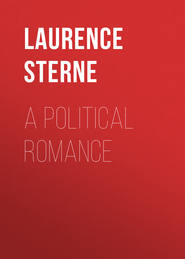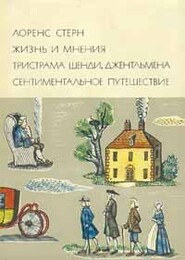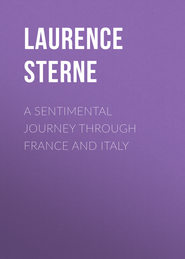По всем вопросам обращайтесь на: info@litportal.ru
(©) 2003-2025.
✖
The Life and Opinions of Tristram Shandy, Gentleman
Настройки чтения
Размер шрифта
Высота строк
Поля
In five or six minutes I felt slightly the end of her second finger—and presently it was laid flat with the other, and she continued rubbing in that way round and round for a good while; it then came into my head, that I should fall in love—I blush'd when I saw how white a hand she had—I shall never, an' please your honour, behold another hand so white whilst I live—
–Not in that place, said my uncle Toby—
Though it was the most serious despair in nature to the corporal—he could not forbear smiling.
The young Beguine, continued the corporal, perceiving it was of great service to me—from rubbing for some time, with two fingers—proceeded to rub at length, with three—till by little and little she brought down the fourth, and then rubb'd with her whole hand: I will never say another word, an' please your honour, upon hands again—but it was softer than sattin—
–Prithee, Trim, commend it as much as thou wilt, said my uncle Toby; I shall hear thy story with the more delight—The corporal thank'd his master most unfeignedly; but having nothing to say upon the Beguine's hand but the same over again—he proceeded to the effects of it.
The fair Beguine, said the corporal, continued rubbing with her whole hand under my knee—till I fear'd her zeal would weary her—'I would do a thousand times more,' said she, 'for the love of Christ'—In saying which, she pass'd her hand across the flannel, to the part above my knee, which I had equally complain'd of, and rubb'd it also.
I perceiv'd, then, I was beginning to be in love—
As she continued rub-rub-rubbing—I felt it spread from under her hand, an' please your honour, to every part of my frame—
The more she rubb'd, and the longer strokes she took—the more the fire kindled in my veins—till at length, by two or three strokes longer than the rest—my passion rose to the highest pitch—I seiz'd her hand—
–And then thou clapped'st it to thy lips, Trim, said my uncle Toby—and madest a speech.
Whether the corporal's amour terminated precisely in the way my uncle Toby described it, is not material; it is enough that it contained in it the essence of all the love romances which ever have been wrote since the beginning of the world.
Chapter 4.XLVII
As soon as the corporal had finished the story of his amour—or rather my uncle Toby for him—Mrs. Wadman silently sallied forth from her arbour, replaced the pin in her mob, pass'd the wicker gate, and advanced slowly towards my uncle Toby's sentry-box: the disposition which Trim had made in my uncle Toby's mind, was too favourable a crisis to be let slipp'd—
–The attack was determin'd upon: it was facilitated still more by my uncle Toby's having ordered the corporal to wheel off the pioneer's shovel, the spade, the pick-axe, the picquets, and other military stores which lay scatter'd upon the ground where Dunkirk stood—The corporal had march'd—the field was clear.
Now, consider, sir, what nonsense it is, either in fighting, or writing, or any thing else (whether in rhyme to it, or not) which a man has occasion to do—to act by plan: for if ever Plan, independent of all circumstances, deserved registering in letters of gold (I mean in the archives of Gotham)—it was certainly the Plan of Mrs. Wadman's attack of my uncle Toby in his sentry-box, By Plan—Now the plan hanging up in it at this juncture, being the Plan of Dunkirk—and the tale of Dunkirk a tale of relaxation, it opposed every impression she could make: and besides, could she have gone upon it—the manoeuvre of fingers and hands in the attack of the sentry-box, was so outdone by that of the fair Beguine's, in Trim's story—that just then, that particular attack, however successful before—became the most heartless attack that could be made—
O! let woman alone for this. Mrs. Wadman had scarce open'd the wicker-gate, when her genius sported with the change of circumstances.
–She formed a new attack in a moment.
Chapter 4.XLVIII
—I am half distracted, captain Shandy, said Mrs. Wadman, holding up her cambrick handkerchief to her left eye, as she approach'd the door of my uncle Toby's sentry-box—a mote—or sand—or something—I know not what, has got into this eye of mine—do look into it—it is not in the white—
In saying which, Mrs. Wadman edged herself close in beside my uncle Toby, and squeezing herself down upon the corner of his bench, she gave him an opportunity of doing it without rising up—Do look into it—said she.
Honest soul! thou didst look into it with as much innocency of heart, as ever child look'd into a raree-shew-box; and 'twere as much a sin to have hurt thee.
–If a man will be peeping of his own accord into things of that nature—I've nothing to say to it—
My uncle Toby never did: and I will answer for him, that he would have sat quietly upon a sofa from June to January (which, you know, takes in both the hot and cold months), with an eye as fine as the Thracian Rodope's (Rodope Thracia tam inevitabili fascino instructa, tam exacte oculus intuens attraxit, ut si in illam quis incidisset, fieri non posset, quin caperetur.—I know not who.) besides him, without being able to tell, whether it was a black or blue one.
The difficulty was to get my uncle Toby, to look at one at all.
'Tis surmounted. And
I see him yonder with his pipe pendulous in his hand, and the ashes falling out of it—looking—and looking—then rubbing his eyes—and looking again, with twice the good-nature that ever Galileo look'd for a spot in the sun.
–In vain! for by all the powers which animate the organ—Widow Wadman's left eye shines this moment as lucid as her right—there is neither mote, or sand, or dust, or chaff, or speck, or particle of opake matter floating in it—There is nothing, my dear paternal uncle! but one lambent delicious fire, furtively shooting out from every part of it, in all directions, into thine—
–If thou lookest, uncle Toby, in search of this mote one moment longer,—thou art undone.
Chapter 4.XLIX
An eye is for all the world exactly like a cannon, in this respect; That it is not so much the eye or the cannon, in themselves, as it is the carriage of the eye—and the carriage of the cannon, by which both the one and the other are enabled to do so much execution. I don't think the comparison a bad one: However, as 'tis made and placed at the head of the chapter, as much for use as ornament, all I desire in return, is, that whenever I speak of Mrs. Wadman's eyes (except once in the next period), that you keep it in your fancy.
I protest, Madam, said my uncle Toby, I can see nothing whatever in your eye.
It is not in the white; said Mrs. Wadman: my uncle Toby look'd with might and main into the pupil—
Now of all the eyes which ever were created—from your own, Madam, up to those of Venus herself, which certainly were as venereal a pair of eyes as ever stood in a head—there never was an eye of them all, so fitted to rob my uncle Toby of his repose, as the very eye, at which he was looking—it was not, Madam a rolling eye—a romping or a wanton one—nor was it an eye sparkling—petulant or imperious—of high claims and terrifying exactions, which would have curdled at once that milk of human nature, of which my uncle Toby was made up—but 'twas an eye full of gentle salutations—and soft responses—speaking—not like the trumpet stop of some ill-made organ, in which many an eye I talk to, holds coarse converse—but whispering soft—like the last low accent of an expiring saint—'How can you live comfortless, captain Shandy, and alone, without a bosom to lean your head on—or trust your cares to?'
It was an eye—
But I shall be in love with it myself, if I say another word about it.
–It did my uncle Toby's business.
Chapter 4.L
There is nothing shews the character of my father and my uncle Toby, in a more entertaining light, than their different manner of deportment, under the same accident—for I call not love a misfortune, from a persuasion, that a man's heart is ever the better for it—Great God! what must my uncle Toby's have been, when 'twas all benignity without it.
My father, as appears from many of his papers, was very subject to this passion, before he married—but from a little subacid kind of drollish impatience in his nature, whenever it befell him, he would never submit to it like a christian; but would pish, and huff, and bounce, and kick, and play the Devil, and write the bitterest Philippicks against the eye that ever man wrote—there is one in verse upon somebody's eye or other, that for two or three nights together, had put him by his rest; which in his first transport of resentment against it, he begins thus:
'A Devil 'tis—and mischief such doth work
As never yet did Pagan, Jew, or Turk.'
(This will be printed with my father's Life of Socrates, &c. &c.)
In short, during the whole paroxism, my father was all abuse and foul language, approaching rather towards malediction—only he did not do it with as much method as Ernulphus—he was too impetuous; nor with Ernulphus's policy—for tho' my father, with the most intolerant spirit, would curse both this and that, and every thing under heaven, which was either aiding or abetting to his love—yet never concluded his chapter of curses upon it, without cursing himself in at the bargain, as one of the most egregious fools and cox-combs, he would say, that ever was let loose in the world.
My uncle Toby, on the contrary, took it like a lamb—sat still and let the poison work in his veins without resistance—in the sharpest exacerbations of his wound (like that on his groin) he never dropt one fretful or discontented word—he blamed neither heaven nor earth—or thought or spoke an injurious thing of any body, or any part of it; he sat solitary and pensive with his pipe—looking at his lame leg—then whiffing out a sentimental heigh ho! which mixing with the smoke, incommoded no one mortal.
He took it like a lamb—I say.
In truth he had mistook it at first; for having taken a ride with my father, that very morning, to save if possible a beautiful wood, which the dean and chapter were hewing down to give to the poor (Mr. Shandy must mean the poor in spirit; inasmuch as they divided the money amongst themselves.); which said wood being in full view of my uncle Toby's house, and of singular service to him in his description of the battle of Wynnendale—by trotting on too hastily to save it—upon an uneasy saddle—worse horse, &c. &c…it had so happened, that the serous part of the blood had got betwixt the two skins, in the nethermost part of my uncle Toby—the first shootings of which (as my uncle Toby had no experience of love) he had taken for a part of the passion—till the blister breaking in the one case—and the other remaining—my uncle Toby was presently convinced, that his wound was not a skin-deep wound—but that it had gone to his heart.
Chapter 4.LI
The world is ashamed of being virtuous—my uncle Toby knew little of the world; and therefore when he felt he was in love with widow Wadman, he had no conception that the thing was any more to be made a mystery of, than if Mrs. Wadman had given him a cut with a gap'd knife across his finger: Had it been otherwise—yet as he ever look'd upon Trim as a humble friend; and saw fresh reasons every day of his life, to treat him as such—it would have made no variation in the manner in which he informed him of the affair.
'I am in love, corporal!' quoth my uncle Toby.
Chapter 4.LII











